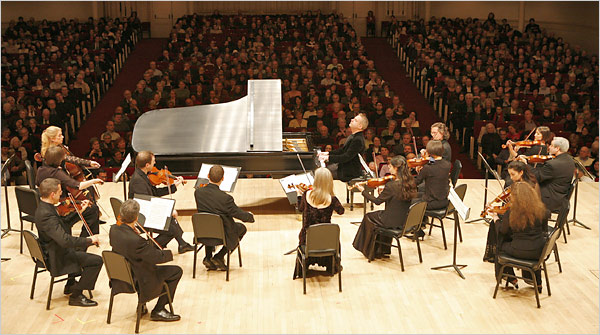 I’m up in Connecticut with Mrs. T, writing captions for the thirty-odd photographs that will be reproduced in A Cluster of Sunlight: The Life of Louis Armstrong, about which more later in the week. I was, alas, out of town when the Orpheus Chamber Orchestra gave the premiere of Paul Moravec‘s Brandenburg Gate at Carnegie Hall last Thursday night, but the composer was on hand to take a well-deserved bow. When not busy composing operas, Paul also writes instrumental music of tremendous distinction and individuality, and Brandenburg Gate, an homage to Bach’s Brandenburg Concerti, is one of his very best pieces. He called me in Connecticut on Friday morning to report that it was a hit, which didn’t surprise me in the least.
I’m up in Connecticut with Mrs. T, writing captions for the thirty-odd photographs that will be reproduced in A Cluster of Sunlight: The Life of Louis Armstrong, about which more later in the week. I was, alas, out of town when the Orpheus Chamber Orchestra gave the premiere of Paul Moravec‘s Brandenburg Gate at Carnegie Hall last Thursday night, but the composer was on hand to take a well-deserved bow. When not busy composing operas, Paul also writes instrumental music of tremendous distinction and individuality, and Brandenburg Gate, an homage to Bach’s Brandenburg Concerti, is one of his very best pieces. He called me in Connecticut on Friday morning to report that it was a hit, which didn’t surprise me in the least.
WNYC broadcast the concert live in New York and has since archived the program on its Web site. You can listen to it, as I did, by going here. The program also includes Haydn’s “Fire” Symphony, Jacques Ibert’s Hommage à Mozart, and the Saint-Saëns G Minor Piano Concerto, performed by Jean-Yves Thibaudet. To listen to Brandenburg Gate, skip forward to the thirty-minute mark in the playback. The performance is followed by an interview with Paul that was taped earlier in the day.
The announcers made public something that I’ve been keeping more or less under wraps until now, which is that Paul suffered a mild stroke in August. I’m sure I don’t need to tell you how scary that was, but the stroke, as you’ll hear when you listen to Paul talking about Brandenburg Gate, had no effect whatsoever on his mental processes (except that his e-mails were full of misspelled words for a week or so!). I’m delighted to say that he’s been spending the past few weeks orchestrating The Letter, which is, like A Cluster of Sunlight, moving steadily toward the finish line.
If you’d like to celebrate with us, check out Brandenburg Gate. I think you’ll like what you hear.
Archives for October 20, 2008
TT: Almanac
“Politics in a literary work is like a gun shot in the middle of a concert, something vulgar, and however, something which is impossible to ignore.”
Stendhal, The Charterhouse of Parma (trans. Jeri King)
